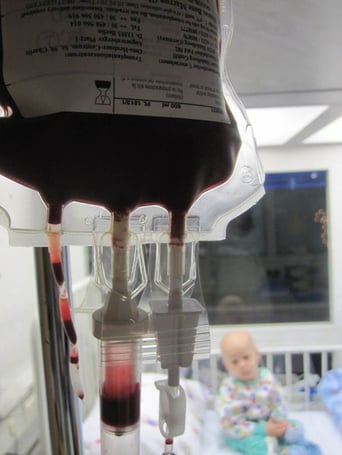Over 6 million cosmetic surgery procedures are done each year using Botox, a form of the botulinum toxin. However, besides reducing wrinkles, botulinum toxins are used to treat over 20 medical conditions. These include severe neck and shoulder muscle spasms, chronic migraines, excessive sweating, leaky or over active bladders, facial spasms, and Cerebral Palsy. Botulinum toxins are also quite deadly. In fact, one gram--the equivalent to ¼ teaspoon of sugar--could kill over a million people.
Read MoreTags: UW, Wisconsin, University of Wisconsin, University of Wisconsin Madison, UWisc, UW Madison, Biotechnology Vendor Fair, Madison, BioResearch Fair, Bioreseach, 2016, wisconsin science trade fair, University of Wisconsin School of Medicine, Botox, botulinum

(Image courtesy of Wikimedia Commons)
Finding matching donors for patients who need bone marrow transplants can be challenging. For ethnic minorities the chances of finding an unrelated donor who is a match through the national donor registry is less than 35 percent. However, thanks to a three year, $600,000 grant from the Leukemia and Lymphoma Society researchers and physicians at the University of Arizona-Tucson are hoping to improve the odds of survival for those patients. This new research funding will be used to support ongoing biomedical research at the UA Steele Children’s Research Center into improving haploidentical bone marrow transplantations (haplo-BMT) as well as launching clinical trials at the UA Cancer Center.
Read MoreTags: Biomedical Reearch, University of Arizona Tucson, UA, research grants, BioResearch Fair, Bone marrow transplants
Tags: New Jersey, Rutgers University, BioResearch Fair, Bioresearch Grant, Dr. Eric Klein, Bacterial Cell Research
Bacterial cells commonly act as little machines in the lab of a bioresearcher. Some fluoresce as they bind to certain particles, others change color based on the presence of a certain chemical in solution. Useful as these cells are, they are generally pre-set; each lab has to find one that does the necessary job or wait for one to be discovered. Now the wait is over – thanks to a research team at the University of Michigan, Ann Arbor, where programmable bacterial cells are quickly becoming a reality.
Tags: 2014, Midwest, Michigan, University of Michigan Ann Arbor, Ann Arbor, UMich, BioResearch Fair
Occasionally in the research world, investigation in one particular study can lead to accidental and novel discoveries in another. Such was the case recently as the University of Michigan, Ann Arbor, where life science researchers working on zebrafish embryos stumbled upon a revelation about colon cancer that also applies to humans.
Tags: University of Michigan, 2014, Midwest, 2013, Michigan, University of Michigan Ann Arbor, Ann Arbor, MI, UMich, BioResearch Fair

